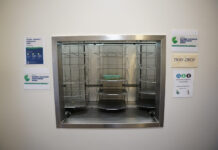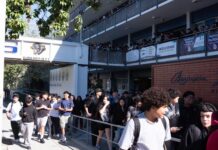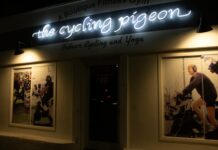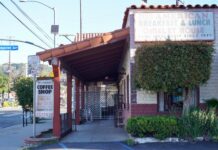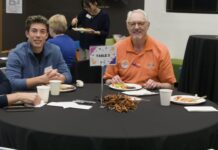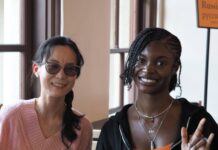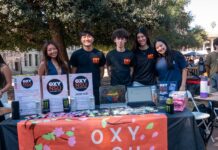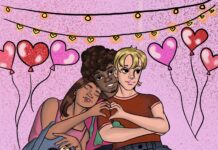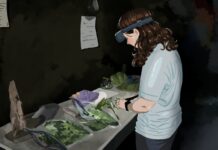Exactly 50 years ago today, the Rev. Dr. Martin Luther King Jr. spoke in Thorne Hall to an audience of more than 1,000 students and faculty April 12, 1967. His speech, titled “The Future of Integration,” drew connections between the Vietnam War, poverty and the Civil Rights Movement. King’s time at Occidental marked a moment in history rife with political and social conflict, at home and abroad. When King came to Occidental, only 15 years had passed since the first black Occidental students had graduated, all fraternities were segregated and the student body was almost entirely white. In collaboration with The Occidental College Library Special Collections & College Archives, The Occidental Weekly gathered images, excerpts from King’s speech and archived Weekly articles about King’s visit. Today, we look back.
When King came to speak at Occidental that April, he was under fire by other influential politicians and activists, like Dr. Ralph Bunche for broadening his scope of activism from civil rights to human rights. Just weeks before his speech at Occidental, King spoke at Riverside Church denouncing the Vietnam War. The speech titled, “Beyond Vietnam” diverged from President Lyndon B. Johnson’s foreign policy. In his strong anti-war sentiment, King joined millions across the nation engaging in civil unrest in response to the war. According to King, the connections between the war and the Civil Rights Movement were deeply rooted and inextricable.
President Gilman invited the Rev. Dr. Martin Luther King to speak on campus.
In 1967, race rebellions were exploding across the country. The government had only recently passed both the Civil Rights Act (1964) and Voting Rights Act (1965). King had led the march from Selma to Montgomery and his “I Have a Dream” speech was heard around the world. At the time of King’s visit to Occidental, he had entered a more nuanced phase of his career — involvement in foreign policy.
Professor Eric Newhall of the English department was a senior at Occidental when King spoke. He recalled that Occidental in 1967 was not nearly as progressive as it is today. The Core Program, then called, “the History of Western Civilization,” did not have any authors or scholars of color on the reading list. Yet, during his time as a student, Newhall acknowledged that his generation was part of a transitional group within America, watching the country undergo drastic political and social changes.
“In the fall of my freshman year, John Kennedy was assassinated … and that was a very unsettling thing to happen when you first get to college. From that point on, it was one thing after another. There was tremendous change, tremendous violence,” Newhall said.
Thorne hall was filled at capacity to attend his speech “The future of integration”.
When Dr. King began his speech in Thorne Hall, it was filled beyond capacity.
“Thorne was electric … With King, people were sitting in the aisles. The fire marshal wasn’t happy,” Newhall said.
King’s speech addressed the need for a holistic approach to racial integration. He called for both political legislation and social change. Legislation, to King, ensured that racially motivated crimes were made illegal. Social change, on the other hand, would work to root out the ingrained racist beliefs in American society.
“So our nation’s summers of riots are caused by our nation’s winters of delay. As long as justice is postponed, there is the danger that people will engage in such tragic activities. Social progress, a positive establishment of justice, will do more to end riots than anything i can think of at this time. And so the challenge facing America is to really work out positive and strong programs that will solve the problems that we face in all of our cities,” King said at Occidental.
Professor Newhall noted the deep connections between King’s speech at Occidental and King’s speech at the Riverside Church. Discussions of domestic policy with regard to civil rights were paralleled by discussions of foreign policy with regard to human rights.
“Now there is another thing that we must see as we deal with a massive action program, and that is that the Negro cannot solve the problem by himself. I know there are those who say we must lift ourselves by our own bootstraps, and of course the Negro must do everything that he can to lift himself by his bootstraps. We advocate this in all of our programs … It’s a wonderful thing to tell people to lift themselves by their own bootstraps, but it is a cruel jest to tell a bootless man that he ought to lift himself by his own bootstraps. And the fact is that millions of Negroes have been so scarred and bruised and damaged by centuries of denial and neglect that they can never lift themselves by their own bootstraps … Unfeeling questions are raised: Why can’t the Negro do what somebody else did? The fact is that nobody really has done it all alone. It has been done by alliances and forces and coalitions working together, and I say that this has to happen where the Negro is concerned,” King said.
Mlk’s speech was widely anticipated, according to both Newhall and Richard Gilman, the president of Occidental from 1956–1988.
Newhall recalled that Dr. King’s speech also referenced economic inequity as a feature of racial injustice, both at home and abroad.
“The gist of King’s speech was: ‘we are a very rich country. But we are not so rich that we can afford both guns and butter,’” Newhall said. “We cannot afford to wage a war on poverty at home and wage a war in Vietnam … King gave everyone an authentic taste of the pain he was feeling about racial injustice and the Vietnam War.”
The students at Occidental in 1967 had enormous respect for Dr. King, according to Newhall. His speech was widely anticipated, according to both Newhall and Richard Gilman, the president of Occidental from 1956–1988.
“In a desire to raise [racial] awareness to a higher level, I decided to seek out Dr. Martin Luther King … He was widely recognized at the time as the foremost civil rights leader in the country,” Gilman said.
MLK walks around Occidental’s campus.
According to Jim Tranquada, Director of Communications, the history of Occidental and social justice goes back to the college’s founding.
“If we are to make brotherhood a reality, the white man must treat the Negro right, not merely because the law says so, but because it’s natural, because it’s right, and because the Negro is his brother,” King said. “If the problem is to be solved, men and women must rise to the majestic heights of being obedient to the unenforceable.”
Today, April 12, the Office of Community Engagement (OCE), Special Collections and the Media Arts and Culture Department (MAC) will be hosting an event at 6 p.m. remembering King’s time at Occidental and his legacy in America and abroad. Media Arts and Culture Professor Sonja Bertucci will be projecting a visual component of the audio recording of King’s speech in Thorne auditorium, followed by a question and answer section. Occidental alumni who attended the event will be present to share their experiences and discuss the relevance of King’s message today, according to Rhonda Brown, chief diversity officer and Ella Turenne, assistant dean for the OCE.
In collaboration with the Occidental College Library Special Collections & College Archives
Photos by Joe Friezer
Site by: Sylabo Creative
![]()




